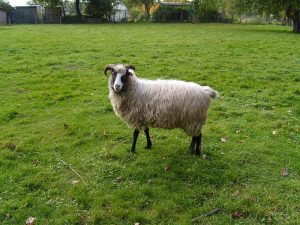By NewsDesk @infectiousdiseasenews
Saskatchewan Agriculture is reporting on the confirmation of anthrax in a sheep on a premises in RM of South Qu’Appelle #157, causing the death of the animal.

It is the suspected cause of death of four additional sheep on the same premises.
Anthrax is caused by the bacteria Bacillus anthracis, which can survive in spore form for decades in soil. Changes in soil moisture, from flooding and drying, can lead to a build-up of the spores on pastures. Spores can concentrate in sloughs and potholes, and there is increased risk of animal exposure to anthrax in drier years when these areas dry up and become accessible. Spores can also surface when the ground is excavated or when there is excessive run-off.
Livestock are infected when they eat forage contaminated with spores. Ruminants such as bison, cattle, sheep and goats, are highly susceptible, and horses can also be infected. Swine, birds and carnivores are more resistant to infection, but farm dogs and cats should be kept away from carcasses.
Affected animals are usually found dead without any signs of illness. Anthrax can be prevented by vaccination. Producers in regions that have experienced previous outbreaks are strongly encouraged to vaccinate their animals each year. If your neighbors’ animals have anthrax, you should consider vaccination to protect your animals.
The carcasses of any animal suspected of having anthrax should not be moved or disturbed, and should be protected from scavengers such as coyotes or ravens, to prevent spreading spores in the environment.
Anyone who suspects anthrax should contact their local veterinarian immediately for diagnosis. All tests must be confirmed by a laboratory diagnosis. All positive test results must be immediately reported to the provincial Chief Veterinary Officer.
Producers are advised to use caution when handling potentially infected animals or carcasses. Animal cases pose minimal risk to humans but people can become infected through direct contact with sick animals or carcasses. In cases where people believe they have been exposed to an infected animal, they should contact their local health authority or physician for advice.
Canada: Syphilis sees sharp spike in Hastings and Prince Edward Counties
British Columbia: Rabies risk after contact with an injured bat at White Pine Beach, Belcarra
Canada anthrax hoax: St. Catharines man, Joseph Knipfel arrested and charged
Canada: H3N2 variant influenza case reported in Manitoba


